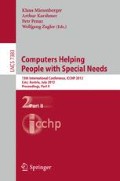Abstract
A Brain-Computer Interface (BCI) can provide an additional option for a person to express himself/herself if he/she suffers a disorder like amyotrophic lateral sclerosis (ALS), brainstem stroke, brain or spinal cord injury or other diseases affecting the motor pathway. For a P300 based BCI a matrix of randomly flashing characters is presented to the participant. To spell a character the person has to attend to it and to count how many times the character flashes. The aim of this study was to compare performance achieved by subjects suffering major motor impairments with that of healthy subjects. The overall accuracy of the persons with motor impairments reached 70.1% in comparison to 91% obtained for the group of healthy subjects. When looking at single subjects, one interesting example shows that under certain circumstances, when the patient finds difficult to concentrate on one character for a long period of time, reduce the number of flashes can increase the accuracy. Furthermore, the influence of several tuning parameters is discussed as it shows that for some participant’s adaptations for achieving valuable spelling results are required. Finally, exclusion criteria for people who are not able to use the device are defined.
Access this chapter
Tax calculation will be finalised at checkout
Purchases are for personal use only
Preview
Unable to display preview. Download preview PDF.
References
Sellers, E.W., Krusienski, D.J., McFarland, D.J., Vaughan, T.M., Wolpaw, J.R.: A P300 event-related potential brain-computer interface (BCI): the effects of matrix size and inter stimulus interval on performance. Biol. Psychol. 73(3), 242–252 (2006)
Zhang, H., Guan, C., Wang, C.: Asynchronous P300-based brain-computer interfaces: a computational approach with statistical models. IEEE Trans. Biomed. Eng. 55(6), 1754–1763 (2008)
Aloise, F., Schettini, F., Arico, P., Leotta, F., Salinari, S., Mattia, D., Babiloni, F., Cincotti, F.: P300-based brain–computer interface for environmental control: an Asynchronous approach. J. Neural Eng. 8, 025025 doi: 10.1088/1741-2560/8/2/025025
Aloise, F., Schettini, F., Aricò, P., Salinari, S., Guger, C., Rinsma, J., Aiello, M., Mattia, D., Cincotti, F.: Asynchronous P300-based brain computer interface to control a virtual environment: initial tests on end users. Clin. EEG Neurosci. 42(3), 219–224 (2011)
Guger, C., Daban, S., Sellers, E., Holzner, C., Krausz, G., Carabalona, R., et al.: How many people are able to control a P300-based brain-computer interface (BCI)? Neurosci. Lett. 462(1), 94–98 (2009)
Fatourechi, M., Bashashati, A., Ward, R.K., Birch, G. E.: EMG and EOG artifacts in brain computer interface systems: a survey. Clin. Neurophysiol. 118(3), 480–494 (2007)
Author information
Authors and Affiliations
Editor information
Editors and Affiliations
Rights and permissions
Copyright information
© 2012 Springer-Verlag Berlin Heidelberg
About this paper
Cite this paper
Lechner, A. et al. (2012). Comparing the Accuracy of a P300 Speller for People with Major Physical Disability. In: Miesenberger, K., Karshmer, A., Penaz, P., Zagler, W. (eds) Computers Helping People with Special Needs. ICCHP 2012. Lecture Notes in Computer Science, vol 7383. Springer, Berlin, Heidelberg. https://doi.org/10.1007/978-3-642-31534-3_27
Download citation
DOI: https://doi.org/10.1007/978-3-642-31534-3_27
Publisher Name: Springer, Berlin, Heidelberg
Print ISBN: 978-3-642-31533-6
Online ISBN: 978-3-642-31534-3
eBook Packages: Computer ScienceComputer Science (R0)

